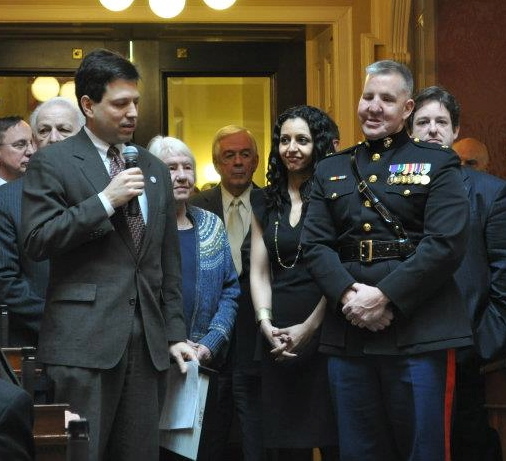As a Marine veteran, I've heard the "thank you for your service" phrase again and again, especially during last week's Veterans Day celebrations. Maybe I should feel honored, but more often I feel annoyed, because many times it comes across like an empty gesture (I am not referring here to the heartfelt instances). I often wonder how many people really think about what service truly means or have ever talked with a former servicemember about life in the military.
Veterans sacrificed not just in what they did during their time in the military, but in what they didn't do or have--the typical entry-level positions or a 9-5 job that provides career advances, a competitive salary, and time to enjoy quality time with their family and friends.
Too often we think holding a parade or shaking a veteran's hand is the extent of our duty to them. But if we really want to honor veterans, we should do something more substantive. What you do for a veteran is often more important than what you say.
Here are 10 ideas on how you can actually help veterans and really thank them for their service.
1.Write a check. There are countless veterans organizations that could use some extra cash for programs that help wounded warriors, assist current servicemembers who are having financial difficulties and give job counseling to people leaving the military. You could research an organization on your own or ask a veteran for their input.
2.Donate your frequent-flyer miles. Do you travel a lot for work or pleasure? If you collect frequent-flyer miles, you can donate them. Consider donating some to the Fisher House Foundation's Hero Miles Program, which helps family members be close to the bedsides of loved ones who were injured.
3.Offer your expertise. You know the old saying, time is money. Instead of just giving cash, you could also give some of your time to a veterans group. Think about which skills you have from your job which might be beneficial. Do you work in construction? You could help build houses for wounded veterans.
4.Bring in a veteran speaker. There's a reason people say that someone was telling "war stories." Veterans have great insight into leadership, crisis management and personal grit. The next time you're planning a corporate event, look into bringing a speaker who served in the military.
5.Hire a veteran. If you work in any kind of management position, you can help your business or nonprofit improve its veteran hiring practices. A great place to start is PsychArmor, a nonprofit organization which provides top-class, free webinars on how to find, hire, train and retain veterans and military spouses. Join their 1-5-15 Campaign!
6.Hire a military spouse or caregiver. Supporting military families is as important as supporting veterans themselves. Consider hiring military spouses or caregivers at your next job opening. They are often incredibly talented, educated, and professional.
7.Donate pro bono hours. If you are a lawyer, donate your pro bono hours to a veterans law school clinic or participate in a program supporting veterans in need through your State Bar Association. Many vulnerable vets face legal challenges not only related to their compensation claims with the VA, but also regarding upgrading their discharges, landlord/tenant issues, criminal defense and bankruptcy.
8.Earmark your donations. If you donate money to your alma mater, consider earmarking your donations specifically to support programs and services supporting veterans. Also consider contributing to scholarships at your university that are set aside specifically for veterans. Nonprofit organizations such as Four Block provide critical services to student veterans as they prepare for internships and then jobs in the private sector.
9.Volunteer. If you prefer to focus on grass roots efforts, support and interact with organizations such as the Veteran Success Resource Group that brings together hundreds of veterans and family members in one afternoon to meet representatives from all the local government agencies that hire and support veterans, businesses that want to hire vets or include veteran-owned businesses in their supply chain, universities that provide vet services and a multitude of veteran service organizations.
10.Use a veteran-owned business. Approximately nine percent of the 27 million small businesses in the U.S. are veteran-owned. You could support veteran entrepreneurship by frequenting those businesses or adding them to your company's supply chain. You can learn more from the Coalition for Veteran Owned Business.
I originally posted this article on Medium.

